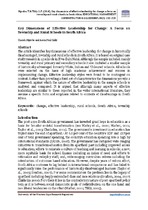Key dimensions of effective leadership for change: a focus on township and rural schools in South Africa
Abstract
The article identifies key dimensions of effective leadership for change in historically disadvantaged, township and rural schools in South Africa. It is based on original case study research in 13 schools in Kwa-Zulu Natal. Although the sample included mainly township and rural primary and secondary schools it also included a smaller sample of historically advantaged formerly White, Indian and ‘Coloured’ schools. All schools were selected on the basis of high academic achievement and success in implementing change. Effective leadership styles were found to be contingent on context. Rather than providing a fixed set of characteristics the dimensions provide a framework against which the nature of effective leadership in the sample schools is analysed and compared. It is argued that although many aspects of effective leadership are similar to those reported in the wider international literature, they assume a specific form and emphasis related to contexts of disadvantage in South Africa.

